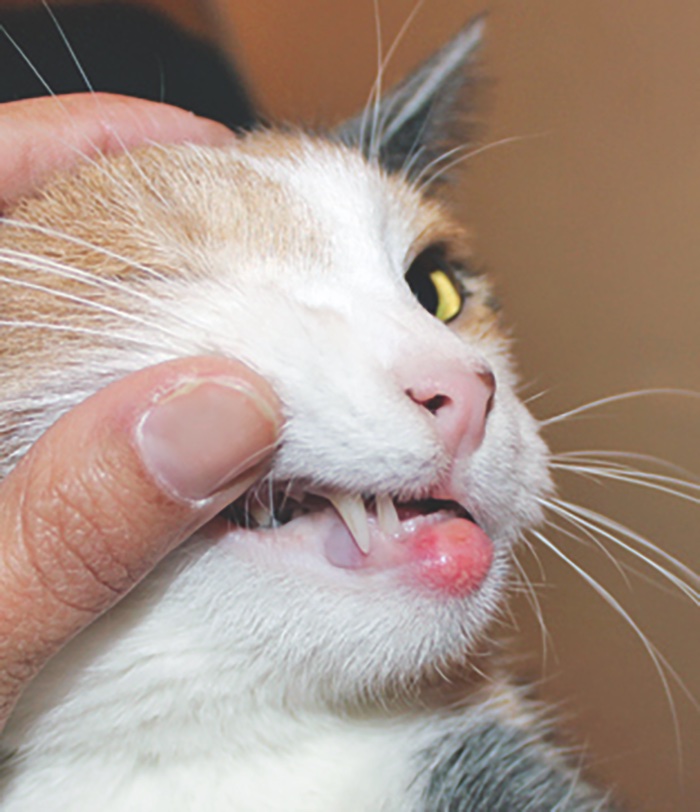Q: I have two adult male cats from the same litter that are suffering from something called “eosinophilic granuloma.” They are both on cetirizine hydrochloride (Zyrtec) daily.
I’ve changed their protein source from grain-free chicken to salmon with no improvement. I’ve tried oclacitinib (Apoquel) for months with no improvement. Their symptoms seem to be seasonal.
One cat has been on cortisone, but as soon as he is weaned off of it, he starts obsessively grooming again and the plaques return. Can you provide any suggestions regarding other options to control this disease?
A: Thanks for getting in touch, and I am very sorry to hear that your kitties have been dealing with this often-frustrating condition. While I can’t provide optimal therapeutic recommendations from afar, perhaps a brief review of feline eosinophilic granuloma complex (EGC) would be helpful to you.
EGC describes one of three basic presentations:
- Indolent ulcers (sore swollen areas usually on the upper lip)
- Eosinophilic plaque (raised, thickened, raw areas on the belly, inner thigh, anal, and throat areas)
- Eosinophilic granuloma (swelling of the lower lip or linear raised lesions on the back of the thighs).
- EGC is not a diagnosis, but rather a series of symptoms of an underlying allergy, or inappropriate immune response to normally benign materials (allergens). The common theme in all of these presentations is dysfunction of a type of immune cell called an eosinophil.
Normally, eosinophils are recruited into action when invading parasites trigger an immune response. They then cause the release of chemicals (called cytokines, like histamine) by other immune cells that help destroy invading parasites, which is a good thing.
With EGC—and any allergic condition—the immune system is activated by allergens rather than by the microbes that it has evolved to protect against, resulting in the release of chemicals like histamine that cause itching, redness, and swelling, all symptoms found in allergic patients.
The fact that these two kitties are related may suggest a shared heritable dysfunction of their immune systems.
The ideal way to address allergic responses is to identify the causative allergen and avoid it. This can be a challenging endeavor, and in some cases the causative allergen is never identified. In these cases, treatment is focused on minimizing the symptoms of itchiness, swelling, and redness using drugs like antihistamines (like cetirizine), other blockers of the chemical pathway that causes itchiness (like oclacitinib), and glucocorticoids (like cortisone).
Glucocorticoids, which inhibit the production of a number of immune-system cytokines, are among the most effective drugs in relieving itchiness in allergic patients, but their long-term use increases the risk for a number of diseases, including diabetes mellitus and urinary tract infections.
Combinations of these drugs can be helpful, and occasionally, trials of antibiotics or other immune modulators like cyclosporine can provide some relief, but determining the allergen that is causing these problems would be ideal.
I see that you have been trying novel protein sources in foods, which is reasonable, as dietary proteins are often the cause of food-related allergies.
It can take some time to figure out the offending dietary protein, though, and food trials must be carried out very strictly and for at least eight weeks before trying another protein source in the event that one trial fails. In some cases, a hydrolyzed diet, in which proteins are partially digested and less likely to elicit an immune response, can be helpful.
The potential seasonality of these lesions raises the possibility of allergies to inhaled allergens (called atopy) like pollens of different species of plants and dust mites kicked up in HVAC systems when they are turned on in homes.
Skin testing, usually performed by a veterinary dermatologist, can be used to rule out atopy, and if an offending allergen is identified, allergen specific immunotherapy (i.e., allergy shots) can be helpful in many cases.
Please consider this information and discuss it with your veterinarian, and send us an update when you can.




